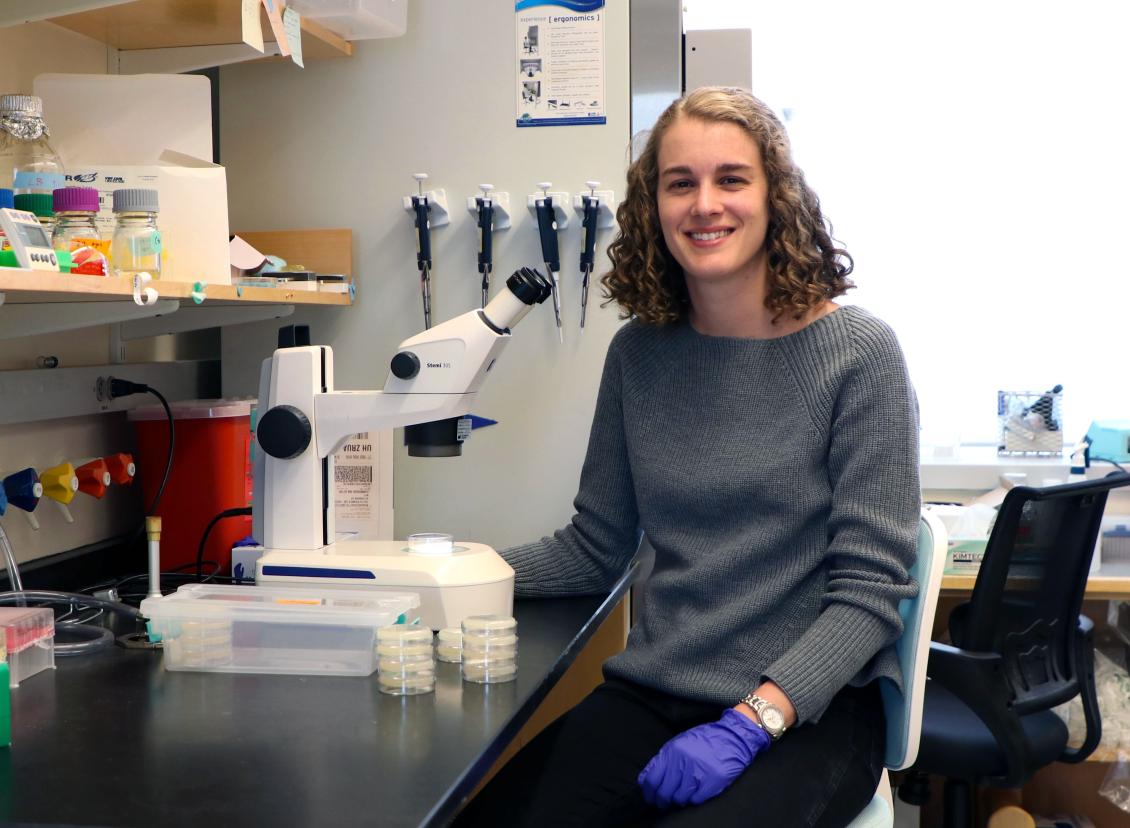Exploring the brain's blueprint

Talya Kramer was given some advice when she started graduate school.
“I had been told to pick your grad lab based on the mentorship you're going to get,” Kramer, now in her sixth year working toward a PhD in biology, recalled. “The research question matters, but having a good advisor is going to make a huge difference, too. ”
She took that guidance, and found a place for herself in the lab of Associate Professor of Brain and Cognitive Sciences Steven Flavell at The Picower Institute for Learning and Memory.
“The lab environment is really excellent. It’s a mix of people who do more computational work and do more experimental work, and it really runs the spectrum. There are people whose expertise is in coding, and people whose expertise is in the wet lab, and they are coming together around the same questions,” Kramer said. “Steve is a fantastic mentor with exceptional scientific knowledge, and his approach plays a big part in the culture in the lab.”
What was the journey that brought you to the Flavell Lab?
I majored in neuroscience and did neuroscience research all throughout my time as an undergrad. I tried a psychology lab one summer to see if that was what I was interested in, but I really felt like looking at the molecular and systems sides of neuroscience appealed to me most.
When I started as a graduate student in biology here, I wanted to keep doing neuroscience research. I'm really drawn to research questions that have a larger picture to them, and I think neuroscience research has the ability to address some really fundamental questions. How do brains work? What is it that makes us human? You're going at these very fundamental truths. I ended up joining Steve’s lab and it has been a really fantastic home for the past few years.
What is the focus of your research?
We work with C. elegans, which are microscopic worms, and they're a perfect mix of complexity and simplicity. They are see-through, which is practically useful because it lets you image them without doing anything invasive, but they also have complex behavioral repertoires. You can look at their sensory responses, you can look at their mating behavior, you can look at their sleep behavior, but they only have 300 brain cells driving all of that behavior. This means they're using very few nodes to direct these complex behaviors, which allows you to look at everything at once. It is a neuroscientist’s dream.
My project is looking at their olfactory responses. Worms mostly move about their world by smelling. We have a good understanding from past work about neurons that respond to smell. The question I am trying to answer is: how do networks of neurons act together to direct behavioral changes based on smell?
What are some of the potential future benefits of this research?
Research in C. elegans has the potential to discover neural circuits that can be found in higher organisms and serve as a basis for answering fundamental questions about how the brain works. The ability to do whole brain imaging is relatively new in neuroscience. We’re able to look at relatively complex processes and understand how it is that not just one cell does one thing, but an ensemble of cells that acts together to produce important behaviors
To be here and to be able to use these techniques is really wonderful and exciting.
How are the skills you are learning now preparing you for the future?
One of my goals when I started graduate school was to gain computational skills, and now my project relies on generating and analyzing large data sets, which is really exciting. It’s just one example of the numerous things I’ve learned here, there are so many things I have been able to try over the course of this project. There are practical skills, like how to use a unique type of microscope, or how to use different image tracking software, and there are more big picture skills about how to approach questions and obstacles in the research process. Everything I’m learning is preparing and inspiring me to continue with my research.
Kramer was among the presenters at Brains on Brains, the Department of Brain and Cognitive Sciences' biennial symposium.

